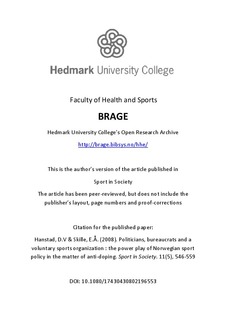Politicians, bureaucrats and a voluntary sports organization : the power play of Norwegian sport policy in the matter of anti-doping
Journal article, Peer reviewed
Permanent lenke
http://hdl.handle.net/11250/134248Utgivelsesdato
2008Metadata
Vis full innførselSamlinger
Originalversjon
Hanstad, D.V & Skille, E.Å. (2008). Politicians, bureaucrats and a voluntary sports organization : the power play of Norwegian sport policy in the matter of anti-doping. Sport in Society. 11(5), 546-559 http://dx.doi.org/10.1080/17430430802196553Sammendrag
The aim of this essay is to understand the tripartite relationship between politicians and bureaucrats in the public sector and the leadership in voluntary sport organizations. In so doing, we conducted a case study of a specific incident in the history of sport policy, based on written texts (newspaper articles and books) as well as interviews (personal information) from those involved. With Elias¿s game models as the theoretical framework, we analyse the case where the General Director of the Department of Sport Policy (DSP) expressed his personal/political opinion about anti-doping in public, and played the game in two figurations. First, the game was played in the sport figuration, where the General Director¿s competitors were the leaders of the voluntary sport organization (the Norwegian Olympic Committee and Confederation of Sports, NOC). Second, the game moved up a level and was played in a political figuration, where the General Director¿s competitors were the political leadership in the DSP. While the Director General was used to playing one to one, the combination of a union sport figuration and the formal power in the political figuration led to an outcome that no one had intended, namely the resignation of the Director General.
Beskrivelse
The original publication is available at: http://dx.doi.org/10.108017430430802196553
